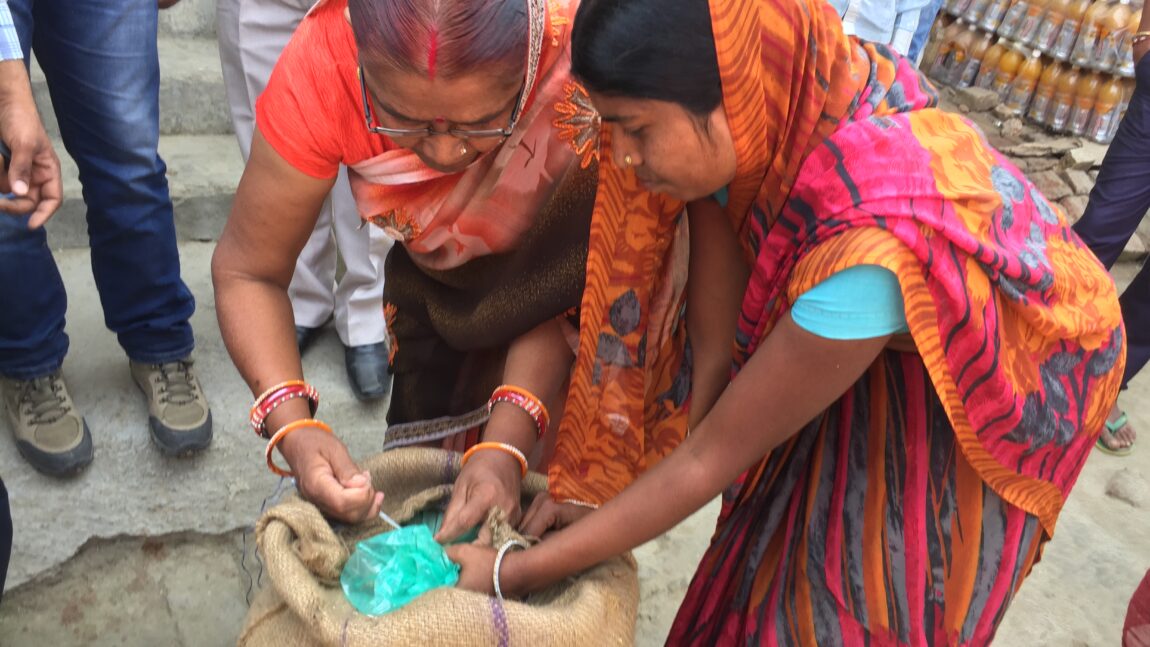Food Systems Research in Bihar, India

The state of Bihar is one of the least economically developed states in India, where close to 80% of the population is dependent on agriculture as their main livelihood. Ninety-one percent of Bihar’s agricultural land is owned by marginal farmers, who own less than a hectare and predominantly grow cereal grains such as maize, pulses, wheat, and rice.
Identifying the issues
ADMI funded the first large-scale micro-level analyses on postharvest losses in Bihar through a randomized control trial (an experimental form of impact evaluation) from 2015-2018. The research, led by Dr. Kathy Baylis, Pallavi Shukla, and Hemant Pullabhotla, gathered data on postharvest management, postharvest losses, and food security from more than 4,000 farm households across four districts.
The research showed that smallholder farmers in Bihar lose up to 10% of their cereal harvest due to poor drying and storage capacity. Moreover, households faced difficulty in maintaining food safety leading to the high prevalence of aflatoxin levels (36%) in maize that resulted in significant quality and economic losses (30% decrease in price). This represents lost income to impoverished farm households and wasted land and water, in a setting where both resources are increasingly scarce and food insecurity is common.
Proposing appropriate solutions
Over the past decade, ADMI has identified promising technologies, such as hermetic bags, that smallholder farmers can use to avoid storage losses and improve grain quality. In a study that measured the return on investment of hermetic bags and farmers’ willingness to pay, data showed that Bihar producers stand to gain a 24% increase in maize revenue through the adoption of better post-harvest practices to reduce quantity and quality losses. Moreover, traders were willing to pay 10% higher prices for grain stored in hermetic bags. The research also demonstrated the importance of food safety from both household consumption and market sale standpoint. Farmers’ willingness to pay increased (13%) when provided with information on harmful health effects of consuming aflatoxin-contaminated grains and how hermetic storage can reduce aflatoxin contamination.
Research findings informed capacity-building training and workshops for more than 18,000 farmers and community workers in Bihar as part of the ADMI Village project and the Climate-Smart Villages project implemented by Borlaug Institute of South Asia, Bihar Agricultural University, and Dr. Rajendra Prasad Central Agriculture University. The capacity-building projects were grounds to validate the technical feasibility of postharvest loss technologies, such as moisture meters. Dr. Kent Rausch and PHL Scholar Amir Jafari conducted an evaluation of grain moisture meters to test their suitability for use in developing countries by comparing them against the oven-drying method.
While ADMI research has shown the advantages of using better postharvest management technologies, such as hermetic bags in combination with drying technologies, there have been significant barriers to scaling. This formed the basis of the ADMI-IFPRI forum on hermetic storage, which brought together the public, private, and research sectors in India to identify solutions to scale-appropriate solutions for better postharvest management. The forum revealed the need for granular data on postharvest losses across the value chain that could inform national and state-level policies, and the lack of established markets for improved postharvest technologies.
Building partnerships for lasting change
In response to the forum, ADMI partnered with the Indian Council for Research on International Economic Relations (ICRIER) on the Postharvest Loss Reduction Policy Initiative to inform and amplify the policy discussion regarding the reduction of food loss and waste along the food value chain in India through joint research and policy engagement. The initiative will develop quality research, provide evidence-based recommendations about policies, and advance policy solutions through engagement with relevant stakeholders focusing on reducing postharvest losses in grains and oilseeds at a national scale through better storage and handling. Currently, a “Review of food loss in India: a macroeconomic perspective” paper has been drafted and efforts are underway to conduct a field study of value chain losses in Bihar.
Additionally, ADMI is addressing the lack of established last-mile distribution networks through a recent partnership with private sector company Grow Indigo. Funded by ADM Cares and ADMI, this research brings together a multi-disciplinary team of economists and business experts led by Baylis and Dr. Madhu Viswanathan to analyze the role of agricultural input dealers in increasing adoption of postharvest technologies and the impact of digital platforms in technology adoption. Preliminary interviews with agro-retailers in target districts in Madhya Pradesh have revealed the informal yet critical role agro-retailers play in promoting new inputs and ag-technologies to farmers, and the importance of the social networks of-input manufacturers and distributors. Currently, a short series of instructional videos on the purpose and benefits of hermetic bags have been developed through a collaborative process with farmers. Through an upcoming randomized controlled experiment, researchers will analyze the impact of information dissemination to retailers in the adoption of postharvest technologies. The research uses Grow Indigo’s digital sales platform ‘Grow Online’ to connect and work with agro-retailers to promote the adoption of hermetic bags.

